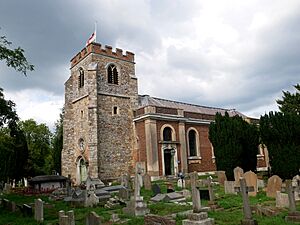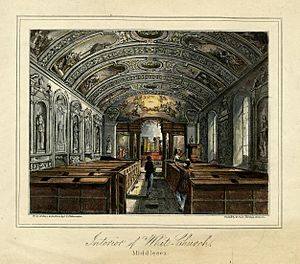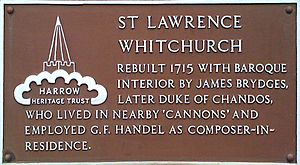St Lawrence's Church, Whitchurch facts for kids
Quick facts for kids St Lawrence's, Whitchurch |
|
|---|---|

St Lawrence's in 2022
|
|
| Location | Whitchurch Lane |
| Country | United Kingdom |
| Denomination | Church of England |
| Website | http://www.littlestanmore.org/ |
| Architecture | |
| Style | Continental Baroque |
| Years built | Tower Circa 1400 Nave reconstructed 1715 |
| Administration | |
| Deanery | Harrow |
| Archdeaconry | Northolt |
| Diocese | London |
| Province | Canterbury |
St. Lawrence, Whitchurch is a historic church located in Little Stanmore, in the London Borough of Harrow, England. It is a Church of England parish church and is considered a very important building, listed as Grade I listed. The church has an old stone tower from around 1360. However, most of the church building was rebuilt in the 1700s in a fancy style called Baroque.
Contents
History of St. Lawrence Church
The original medieval church was rebuilt by an architect named John James. He worked for a very rich person, James Brydges. Brydges later became the 1st Duke of Chandos. He started rebuilding the church and his large home, Cannons, around 1714. This was when he became the 9th Baron Chandos.
Brydges liked to change his architects. In 1715, James Gibbs took over from John James for the house. Gibbs might have also helped finish the church before it reopened in 1716.
Brydges later built a private chapel inside his home. But he still cared a lot about St. Lawrence Church. He had a special gallery there for himself and his guests. He also had the right to choose the vicar (the church leader). He picked John Theophilus Desaguliers, who was known for his work with water engineering. Desaguliers was Brydges' chaplain and engineering helper.
Inside the Church: Decoration and Style
The inside of St. Lawrence Church is very decorated and special for England. It has a "Continental Baroque" style, which means it looks more like churches found in Europe than typical English churches.
Beautiful Paintings and Art
A famous painter named Louis Laguerre and other artists worked on the decorations. They painted both the church and Brydges' home, Cannons.
The Chandos Mausoleum
Towards the end of his life, James Brydges lost a lot of his money. But in 1735, he had a special burial place built. This place, called a mausoleum, was designed by James Gibbs. It was built onto the east end of the church in a European Baroque style.
Important people buried here include the 1st Duke of Chandos and his grandson, James Brydges, 3rd Duke of Chandos.
The main feature inside the mausoleum is a large Baroque monument. It honors the first duke and his first two wives. This monument was originally inside the church before the mausoleum was built. Like the church, the mausoleum also has amazing wall paintings, created by Gaetano Brunetti.
The Organ and Handel's Music
The famous composer Handel worked for James Brydges in 1717 and 1718. He was Brydges' composer-in-residence. During this time, Handel wrote many pieces, including the Chandos Anthems. These were songs based on psalms for use in the Anglican church services.
It is believed that the Chandos Anthems were first performed right here at St. Lawrence Church.
At the east end of the church is the organ. This organ is very old and important, recognized by the British Institute of Organ Studies. People believe Handel himself played this organ. Over the years, it was updated. In 1994, a company called Goetze and Gwynn rebuilt it. They specialize in organs from before the Victorian era. They used the remaining parts of the original 1716 organ as a guide.
Today, the organ is used for concerts as well as church services. Recordings of Handel's organ concertos have even been made using this organ. The mechanism of the organ can be a bit noisy, but it's part of its unique character.
Another composer, William Carter, was the organist at St. Lawrence's Church from 1850 to 1854.
More to Explore
- Canons Park
- Handel at Cannons
 | George Robert Carruthers |
 | Patricia Bath |
 | Jan Ernst Matzeliger |
 | Alexander Miles |



